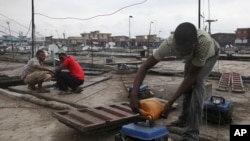Several renewable energy projects are being developed in the West Africa sub region to help reduce high dependence on fuel imports for power generation. But it is important that the right environment is created to attract further investment and also for such schemes to work well.
Mahama Kappiah is an energy expert at the Centre for Renewable Energy and Energy Efficiency (ECREEE) at the Economic Community of West African States (ECOWAS). He said such efforts must include legal and administrative policies to strengthen development of the industry.
“Only government regulations and policies can make sure that power is being taken and used for the benefit of the people,"said Kappiah. "Manpower training and capacity building (are also important). We should be able to train our people to know how the technology works. Unless we have the requisite capacity built within the region, we are still going to have a lot of challenges. And that will make them look like white elephants.”
Kappiah said countries such as Cape Verde and Ghana have begun putting appropriate structures in place with encouraging results.
“Since the government passed the renewable energy law [in Cape Verde] in 2008 and set target for 2015 of 25 percent, they got that target at the end of 2011. The other target for 2020, they expect to get it by 2015”.
“Ghana has passed renewable energy law. They are putting in place the enabling environment. The Energy Commission has indicated that they have registered renewable energy projects to the tune 1000 megawatts. This tells you that the enabling environment is relative to getting these projects off the ground”
Kappiah said renewable energy projects generate other economic activities along the value chain.
“There are people who maintain and operate these equipment. The people are also exposed to new technology that they did not know of, [so] they get better skills which can be applied in other areas.” He said renewable energy can also be applied to improve small-scale irrigation for agriculture.
Mahama Kappiah is an energy expert at the Centre for Renewable Energy and Energy Efficiency (ECREEE) at the Economic Community of West African States (ECOWAS). He said such efforts must include legal and administrative policies to strengthen development of the industry.
“Only government regulations and policies can make sure that power is being taken and used for the benefit of the people,"said Kappiah. "Manpower training and capacity building (are also important). We should be able to train our people to know how the technology works. Unless we have the requisite capacity built within the region, we are still going to have a lot of challenges. And that will make them look like white elephants.”
Kappiah said countries such as Cape Verde and Ghana have begun putting appropriate structures in place with encouraging results.
“Since the government passed the renewable energy law [in Cape Verde] in 2008 and set target for 2015 of 25 percent, they got that target at the end of 2011. The other target for 2020, they expect to get it by 2015”.
“Ghana has passed renewable energy law. They are putting in place the enabling environment. The Energy Commission has indicated that they have registered renewable energy projects to the tune 1000 megawatts. This tells you that the enabling environment is relative to getting these projects off the ground”
Kappiah said renewable energy projects generate other economic activities along the value chain.
“There are people who maintain and operate these equipment. The people are also exposed to new technology that they did not know of, [so] they get better skills which can be applied in other areas.” He said renewable energy can also be applied to improve small-scale irrigation for agriculture.




